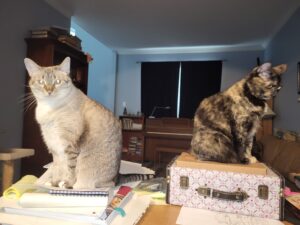by Deborah L. Davitt

The gibbet creaked under her weight as she shifted in place, coiling her tail up, out of reach of the crowd here in Port Royale — most of whom wanted bits of her fur as keep-sakes, it appeared. They’d probably fight over her earrings and jewelry when it came time for her corpse to be removed from her tiny prison.
Not that they’d have a hope of making her earring’s luck work for them, of course.
But that’s what she got for being famous — the Dread Pirate Grace Morraine, scourge of the skies. Her great flying ship, the Elektra, couldn’t save her now.
She licked a paw and straightened her whiskers. There was no point in going to her death untidy.
Guardsmen pushed their way through the crowd, leveling their halberds to do it. The raucous noise of the Parrot and Monkey voices in this tropical port of call faded as those good citizens sidled away from the guards and their sharp-edged weapons. “Oh, good. There’s to be a trial after all,” Grace said, rising to her feet. The gibbet swayed around her. “I thought you were just going to let me raisin away in the sun for the fun of it.”
The guardsmen — Dogs to a man — winced. “Come along,” their leader said, producing a key and unlocking the door of the swaying gibbet. “The Magistrate wants to see you.”
“Do I want to see him?” Grace wondered out loud.
The Dog closest to her grinned crookedly. “Oh, yes. He’s about to make you an offer you shouldn’t refuse.”
The Magistrate was, of course, a Poodle. Long of nose, disdainful of expression, with curls of hair piled atop his head. (Grace was sure it was a wig, well-powdered.) “Grace Morraine?” he said, regarding her through his pince-nez glasses. “There are two ways this meeting can go.”
She stared at the pitcher of water at his elbow. She hadn’t had so much as a sip in two days. “I’m listening.”
“One, you can say no, and you can go back to your gibbet.”
“Let’s say that I say yes.” She flicked her tail insouciantly, but her heart wasn’t in it. “Do I get to live?”
“Aye. You’d take this letter of marque,” he held up a piece of paper, “and you’d agree to continue your depredations on the shipping lines, leaving, of course, the ships of your countrymen strictly alone.”
She felt her eyes widen. “And the catch is?”
“You sell the cargos you capture to us. For a price we set. You pay your taxes. You become–” The magistrate barked out a laugh. “–an honest citizen.”
Grace considered this. With the only other alternative being the gibbet — a gibbet she didn’t see herself getting out of anytime soon, and the Elektra someplace distant, waiting for signs that her captain lived or died — she didn’t see that she had much choice. And yet, could she trust the magistrate?
All signs pointed to no. He’d find some way to swindle her out of her freedom, soon enough. There might be political pressure on him to show results against the podencos soon, and he might not have the manpower to do it without pirates on his side.
Still, trust him or not, she didn’t have much of a choice. “Where do I sign?”
“You can make your X right here — oh, aren’t you clever, you can sign your name.” The condescension made her twitch, but Grace soothed herself to expressionlessness. Her hackles didn’t even rise.
Well, hardly rose, anyway.
“Congratulations. You’re no longer a pirate, Grace Morraine. You’re a privateer.”
Within a week, Grace found herself back aboard the Elektra, her second-in-command yielding the tiller back to her hand with surprising grace — she’d always had Eason marked out as an ambitious sod who’d take control of the ship and not cede it back without putting it to a vote among the crew. “Privateering’s not a bad move, for the moment,” she told her crew, half Cats, the rest Parrots, Monkeys, and the occasional Badger. “Anyone who signs the marque lifts the death sentence against them. So we chase the podencos and take their cargo. Same as we would have done anyway.”
The crew accepted her word, to her great relief. She hadn’t wanted to have to recruit new sailors if the crew as a whole had been too disgruntled at the change of their fortune’s winds.
So it was that she found herself ten thousand feet above the sea, racing through clouds heavy with rain, chasing a trio of galleons laden with treasure that were running before the wind — but the seabound vessels couldn’t match her airborne craft for speed. “Bring the lightning cannons to bear!” Grace shouted, touching the pearl hanging from her ear for good luck.
The Elektra began her dive-bombing routine, letting hot air out of the balloon, reefing her sails, and plummeting towards the galleons. Grace plunged the tiller forward, adjusting pitch and yaw, as her sailors clung to the rigging and belted themselves to the cannons. Lightning sparked in her cannons, and then shot out, blue-white, across the dark indigo of the sea below…
And then the thunder of the cannons hit her, and Grace whooped in joy, ears ringing. This was life. This is what made life worth living, the glory of the hunt, the thrill of the chase. She didn’t play with her kills — oh no. But she circled the galleons, strafing their decks, sending crewmen — all Dogs, all podencos, leaping overboard to avoid the blue-white lightning that sizzled fractals into the wooden decks, and set the sails on fire.
A ragged volley of answering fire came from the galleons — their lightning was red, and shorter-ranged, so Grace danced the Elektra just outside the reach of their cannons. “Just surrender, you daft buggers!” she shouted in a gap between thunderclaps. “Heave to, and prepare to be boarded!” Her fur bristled from the electricity ambient in the air, making her look twice her normal size.
The three galleons slowly surrendered, lowering their flags. She could see sailors throwing buckets of sand on the flames, buckets of seawater. Trying, desperately, to save their own lives by putting out the fires.
Eason, a pure white Cat with a black eyepatch that concealed a missing eye, came to stand at her side at the tiller. “You want to go down yourself?”
“No, I trust you to handle it. The terms are that they turn over all their gold and gems, their wine and liquor.” The first would make the Magistrate happy; the latter would keep her crew happy. “They can keep their tobacco and cotton. We don’t have the hold space for that, anyway.”
“We should get a second ship, so that we do have the hold space.”
She shot him a sidelong look. “And you’d captain her?”
“I’ve proven my loyalty, haven’t I?” Eason countered.
“With the spoils from these three lovelies, we might be able to afford a second ship,” she agreed after a moment. “And yes, you have.” For the moment, Grace thought, but she kept her misgivings tucked behind her eyeballs. Give him command of his own ship, and he might depart on the next fresh breeze, and all her hard-won spoils with him.
Of course, the reason she was letting her executive officer lead the boarding party was because she had a niggling feeling that once the goods were hauled aboard, he’d just up and leave her on the galleon below.
On the other other hand, he could have just left her in port, without a ship to turn towards privateering.
To trust, or not to trust. The eternal conundrum.
Grace hovered the Elektra over the lead galleon, and the descend ropes dropped, sailors from her ship swarming down with Eason, while still more sailors with muskets stood at the railing of the Elektra, giving them cover in case the podencos decided to get frisky.
Then box after box of gold bullion began winching their way to the Elektra’s cargo hold. Barrel after barrel of Madeira wine — to the cheers of her crew. Each galleon was scavenged completely of its wealth, and then the Elektra, groaning a little under the weight, headed for the clouds once more.
“It’s a good life,” Grace told Eason as he came back aboard. Her tone was nearly a purr.
“If you can survive it,” he agreed, and for a moment, that knife’s edge was back. To trust, or not to trust.
But she put out her paw, and he took it in his, and she hauled him over the rail and back aboard. “Set course for Port Royale!” she called to her crew, and their cheers drifted down from the sky, touching even the waves below.
Tomorrow, she’d have to deal with the Magistrate. The sure-to-be-rigged ‘legitimate’ markets of Port Royale, which would surely try to shortchange her on the price of gold, the value of the gems, and the cost to repair the Elektra where the galleons’ crews had pockmarked her underbelly with musket balls. Tomorrow, she’d have to deal with taxes and credits and debits, the lack of honor in her fellow creatures, and more.
But today? Today she was sailing into a sunset, and a glass of rum waited for her in her quarters. Tomorrow could take care of itself for a few hours, while she basked in the glow of the present.
* * *
 About the Author
About the Author
Deborah L. Davitt was raised in Nevada, but currently lives in Houston, Texas with her husband and son. Her award-winning poetry and prose has appeared in over seventy journals, including F&SF, Asimov’s, Analog, and Lightspe
Very imaginative and entertaining.